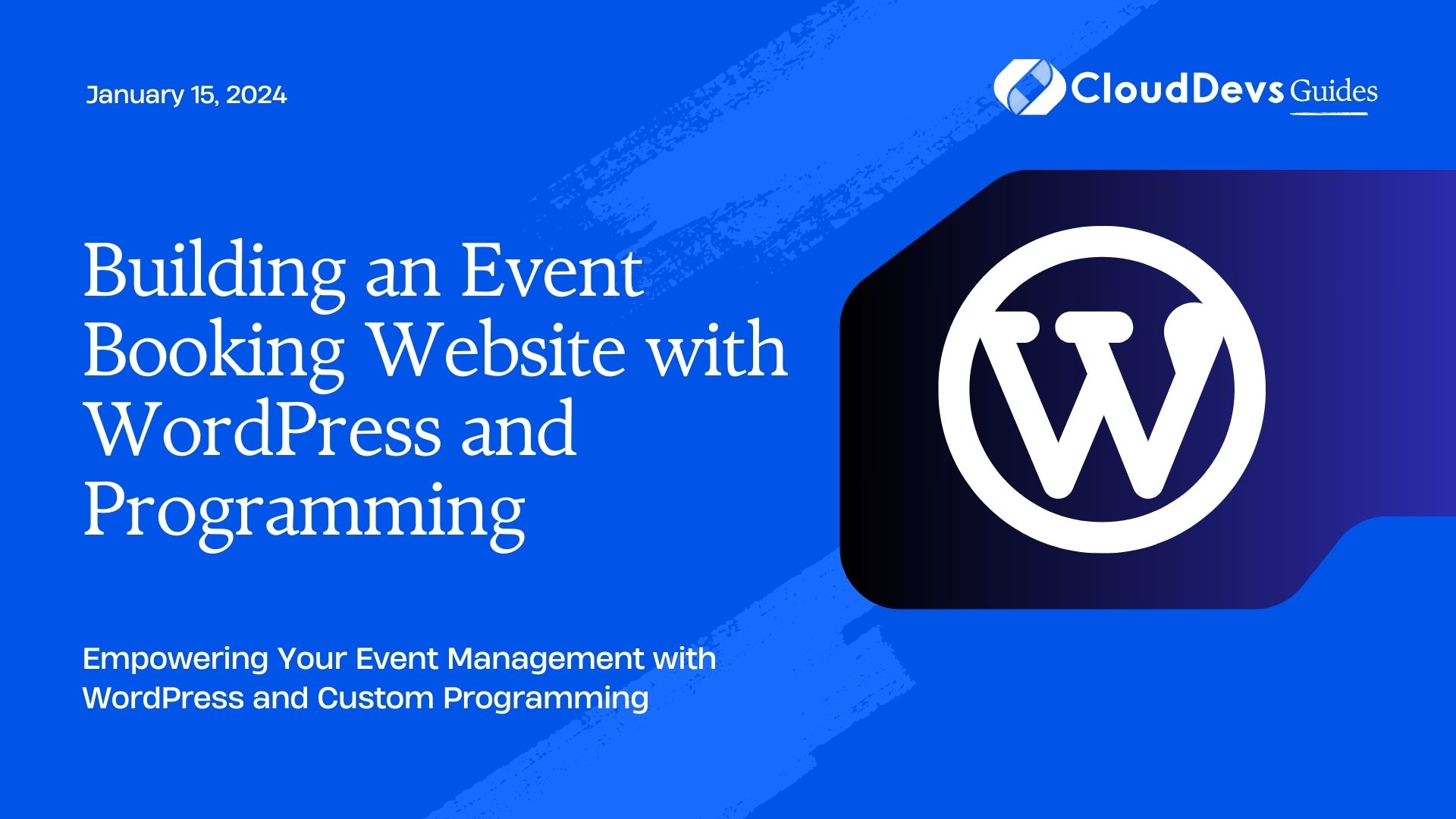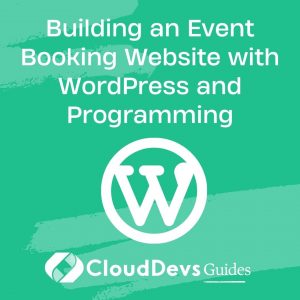Building an Event Booking Website with WordPress and Programming
In the digital age, events play a pivotal role in bringing people together for various purposes – from business conferences to music festivals. As event organizers seek efficient ways to manage and promote their events, having a well-designed event booking website becomes paramount. While platforms like WordPress provide user-friendly tools to set up websites, custom programming adds a layer of versatility and uniqueness. In this guide, we’ll walk you through the process of building an event booking website using WordPress and harnessing the power of programming for a tailored experience.
Table of Contents
1. Why Choose WordPress for Your Event Booking Website?
WordPress has evolved from a simple blogging platform to a versatile content management system (CMS) that powers around 40% of the websites on the internet. Its user-friendly interface, extensive plugin ecosystem, and customizable themes make it an ideal choice for creating event booking websites. Here’s why:
1.1. Intuitive Interface:
WordPress offers an intuitive dashboard that allows even non-technical users to manage content, create pages, and update information effortlessly.
1.2. Rich Plugin Ecosystem:
The WordPress plugin repository is a treasure trove of functionalities. You can easily integrate event management plugins that simplify tasks like ticketing, registration, and scheduling.
1.3. Customizable Themes:
Choose from a plethora of themes, both free and premium, to give your event booking website a professional look. Themes can be customized to match your branding.
1.4. SEO-Friendly:
WordPress is inherently optimized for search engines. By following best SEO practices, your event website can rank higher in search results, attracting more attendees.
2. Creating Your Event Booking Website with WordPress
2.1. Selecting a Domain and Hosting:
Choose a domain name that reflects your event or organization. Select a reliable hosting provider that ensures your website remains accessible and responsive.
2.2. Installing WordPress:
Most hosting providers offer a one-click WordPress installation process. After installation, access your website’s dashboard using the provided credentials.
2.3. Choosing the Right Theme:
Pick a theme that aligns with your event’s aesthetics and functionalities. Ensure the theme is responsive, as a significant portion of users access websites from mobile devices.
2.4. Installing Essential Plugins:
Enhance your event booking website with the following plugins:
2.4.1. The Events Calendar:
This plugin provides a comprehensive set of features for event management, including event creation, ticketing, and scheduling.
2.4.2. WooCommerce:
If you plan to sell tickets or merchandise, WooCommerce is an excellent choice. It seamlessly integrates with WordPress and offers various payment gateways.
2.4.3. Contact Form 7:
Keep communication smooth by allowing attendees to reach out with inquiries. This plugin creates customizable contact forms.
2.5. Designing Important Pages:
2.5.1. Home Page:
Make a compelling first impression. Highlight upcoming events and provide clear calls to action for users to explore further.
2.5.2. Event Listings:
Create a page showcasing all your events. Include filters for easy navigation and ensure each event has a dedicated page with detailed information.
2.5.3. Registration and Ticketing:
Streamline the registration process by integrating a user-friendly ticketing system. Clearly display ticket types, prices, and availability.
2.5.4. About Us and Contact Pages:
Build trust by sharing information about your organization and providing a way for users to get in touch.
2.6. Customizing Your Website:
While themes provide a foundation, you might want to make unique customizations using programming.
2.6.1. Child Themes:
Create a child theme to preserve your customizations even when the main theme receives updates.
2.6.2. Custom CSS:
Add your own CSS code snippets to fine-tune the design to perfection.
2.6.3. Functions.php:
For more advanced changes, use the functions.php file to modify theme behavior or add custom functionalities.
3. Taking Your Event Website to the Next Level with Programming
While WordPress and plugins offer a lot out of the box, programming allows you to tailor your event booking website to your exact needs. Here are some programming aspects to consider:
3.1. Custom Registration Process:
Design a unique registration process that captures specific attendee information based on your event type. This could include personalized questions or waivers.
php
// Example custom registration field
function custom_registration_fields() {
echo '<label for="attendee_type">Attendee Type</label>';
echo '<select id="attendee_type" name="attendee_type">';
echo '<option value="general">General</option>';
echo '<option value="vip">VIP</option>';
echo '</select>';
}
add_action('woocommerce_register_form', 'custom_registration_fields');
3.2. Dynamic Event Scheduling:
Implement a dynamic scheduling system that allows attendees to build their own event itinerary.
javascript
// Example dynamic scheduling feature
function buildItinerary() {
let selectedEvents = [];
$('.event-checkbox').on('change', function() {
if (this.checked) {
selectedEvents.push($(this).data('event-id'));
} else {
const index = selectedEvents.indexOf($(this).data('event-id'));
if (index !== -1) {
selectedEvents.splice(index, 1);
}
}
// Update UI or perform other actions based on selectedEvents
});
}
3.3. Personalized Email Notifications:
Craft customized email notifications for attendees upon registration, ticket purchase, or changes in the event schedule.
php
// Example sending a personalized email notification
function custom_registration_email($user_id) {
$subject = 'Thank You for Registering!';
$message = 'Dear ' . get_user_meta($user_id, 'first_name', true) . ', thank you for registering for our event.';
wp_mail(get_userdata($user_id)->user_email, $subject, $message);
}
add_action('woocommerce_registration_redirect', 'custom_registration_email');
Conclusion
Combining the user-friendly features of WordPress with the power of programming, you can create a feature-rich and highly customizable event booking website. Remember that each event is unique, so tailor your website’s functionalities and design to meet your specific requirements. Whether you’re organizing a small seminar or a large-scale music festival, an engaging and efficient event booking website can significantly enhance the attendee experience and streamline your event management processes. Start building your digital event platform today and make your upcoming events an unforgettable success.
Table of Contents








